A seven year truce and a marriage between the dauphin and Edward's daughter Elizabeth of York were two of the items agreed upon. Edward may have been pleased with his actions, but it was a move that greatly angered the Duke of Gloucester, his outrage is one of the first times we see the future Richard III vocally objecting to a decision made by his brother.
|
The twelve years of King Edward's reign that followed Henry VI's death, were relatively stable, the city saw the redevelopment of St George's Chapel and a new great hall at Eltham Palace. Edward patronised the new invention of printing, the Recuyell of the Histoyes of Troye was the first book to be printed in England. Charles Ross, described Edwards court as "the most splendid in all Christendom." Edward developed a love of art much of seen in Bruges, at the home of his friend Louis of Gruthuyse. Stability in his kingdom lead to Edward making peace with France. In the summer of 1475, on a bridge at Picquigny with a wooden barrier between them Edward and Louis XI came to an agreement. On the 29th of August 1475, the Treaty of Picquigny was signed.
A seven year truce and a marriage between the dauphin and Edward's daughter Elizabeth of York were two of the items agreed upon. Edward may have been pleased with his actions, but it was a move that greatly angered the Duke of Gloucester, his outrage is one of the first times we see the future Richard III vocally objecting to a decision made by his brother.
0 Comments
Behavioural scientists who have studied revenge scanned the brains of people who had been wronged, and the researchers gave these people a chance to punish the wrongdoers. As the victims considered revenge, it was noted that this action caused a notable amount of activity in what scientists call the Caudate Nucleus, an area in the brain that processes rewards, which the researchers equated to the same feeling we feel when we smoke or eat chocolate. Just as one piece of chocolate doesn't satisfy our craving, the act of revenge doesn't deliver justice, it prolongs hostility and leads to other acts of vengeance, creating an unending circle of retaliation. Revenge is ages old, God himself wanted the monopoly on it, Shakespeare wrote of it and the leather clad Beatrix Kiddo practiced it, but vengeance comes at a cost, no more so than in the time of the Wars of the Roses. Deaths as the result of vengeance were frequent occurrences, Edmund, Earl of Rutland, Owen Tudor and Roger Vaughan are an example of this practice. Their deaths were linked, they died over a ten-year period, but despite this length of time and not surprisingly, the pain each felt never diminished, but what is surprising is that each of the condemned never expected it to happen to them and each pleaded for his life. On the 25th of October 1460, the Act of Accord acknowledged Richard, Duke of York, as the heir to Henry VI and effectively disinherited Henry VI’s son Edward. It was hoped that this agreement would put an end to the political tension that had caused so much trouble in previous years, but it was not to be. The Act of Accord naturally left the Lancastrians foaming at the mouth, many were angry that the act had swept the rules of primogeniture under the carpet, a rule that had protected the rights of the noble family for decades, without which there would be chaos. Many Lancastrians rallied to the cause resulting in a number of revolts occurring in the country with Henry's queen, Margaret of Anjou, at its helm. The first serious clash happened in Yorkshire, just over two months after the Act of Accord was signed, as Margaret had headed to Wales, Richard, Duke of York, now heir apparent made his way towards Sandal Castle to meet the forces of the opposing army, even though York's force outnumbered the Lancastrian's by two to one the battle went the way of Lancaster. Richard, Duke of York died in battle that day at Wakefield. David Hume in his History of England writes of York's death "The Duke himself was killed and beheaded, and when his body was found among the slain, the head was cut off by Margaret's orders and fixed on the gates of York, with a paper crown upon it, in derision of his pretended title.' York died among his men, a noble death you could say, his second son, Edmund Earl of Rutland died that day too but his death was a cruel one at the hands of John Clifford. Clifford had a reputation for brutality on the battlefield, John Leland, wrote in 1540 that Clifford was 'for killing of men at the bataill was caullid the boucher.' The most common story told is that Edmund was captured as he fled the battle field, but the quality of his armour was noticed by Clifford who asked him his name. At that point, it seems, Clifford was unaware who Rutland was and was possibly thinking along the lines of a ransom, but a priest going by the name of Aspell shouted "spare him for he is the Prince's son." And thus Rutland's fate was sealed. It was then that John Clifford saw an opportunity to avenge his father's death, his father Thomas Clifford died in the first battle of St Albans in 1455. For Clifford the "sight of any of the House of York was fury to torment his soul" It is John Leland, the 16th century antiquary, who first mentions that it was Clifford who murdered the seventeen-year-old Edmund, William of Worcester in his Annales Rerum Anglicarum writes "and in the flight after the battle, Lord Clifford killed Edmund Earl of Rutland, son of the Duke of York, on the bridge at Wakefield." but its Shakespeare who puts the following words into Clifford's mouth. "Thy father slew mine; and so will I do thee and all thy kin" Thus the seeds were set for bloody revenge, it was Owen Tudor who was the next to die on the order of another angry and grieving young man. Edward had celebrated the Christmas of 1460 in Gloucester with John Tuchet, Walter Devereux, William and Richard Herbert and Roger Vaughan. These five Welsh men were, not only linked to one another by blood and marriage but were an important part of the Yorkist political connection, it was Roger Vaughan of Tretower, who in 1461, would be Edward's henchman. Tudor, along with his son Jasper, had been recruiting men from Wales previous to the Battle of Mortimer's Cross and had made their way to Herefordshire by the beginning of February 1461. After the battle, the elderly Welsh leader was captured along with Henry Scudamore and John Throckmorton. On the news of Tudor's capture, Edward ordered Roger Vaughan to Usk Castle, where it is said Owen Tudor was held captive. Scudamore and Throckmorton may have escaped death but Tudor was summarily executed, beheaded in Hereford market square, the axe swung by Roger Vaughan. The story of how Tudor met his death is much written about as are his final words "That hede shalle ly on the stroke that was wonte to ly on Quene Kateryns lappe' Even though Edward could be lenient if he wished, he had no intention of being so with Owen Tudor. Tudor was executed not because he, along with his son Jasper, was making some attempt to free Henry VI from his captor, or that he had recruited troops in Wales or taken up Margaret of Anjou's cause or because of any treasonous act. Owen Tudor met his death because Edward was determined to avenge the death of his father and brother just as Clifford had. The Earl of March, as Edward IV, did not require that his men love him, but he certainly expected them to obey him. Twenty three days after the Battle of Mortimer's Cross and the death of Owen Tudor, Jasper Tudor wrote to Roger Puleston, Governor of Denbigh Castle, of the defeat at Mortimer's Cross and how he would avenge the death of his father. "Right trusty and well beloved cousins, and friends, we grete you well. And suppose that yee have well in you remembrance the great dishonour ahd rebuke that we and yee late have by traitor Marche, Harbert and Dunne, with their affinityes, as well in letting us fo our journey to the Kinge, as in putting my father your kinsman to the death, and their trayterously demeaning, we purpose with the might of our lord, and assistance of you and other our kinsman, men and friends, within a short time to avenge. Written at our towne of Tenbye the xxvth of ffeur. J Penmroke" Jasper Tudor would spend the next twenty five years as a man on the run, in those years he remained bitter, bitter about the Lancastrian's final defeat, bitter about the loss of land and power in Wales, but he never forgot the name of the man who decapitated his father, but it was ten long years before he would be face to face with him. During Tudor's exile, the Lancastrians made some attempt to drum up support in Brittany, France and Scotland, invasion plans were made and thwarted but eventually Jasper Tudor along with Richard Neville, and Edward's brother the Duke of Clarence arrived in England and landed in Dartmouth and headed for Wales picking up Henry, the future Henry VII on the way. Henry VI was restored to the throne of England on the 30th October 1470, it is Jasper Tudor who had played a significant role in the restored Lancastrian regime but it was, as we have seen, at a personal loss to himself. Is it any wonder then that he seized the opportunity when it did arrive, of unleashing all his pent-up anger on one man, Roger Vaughan. The Vaughan's were a rich and influential Welsh family, who received the lands and castle of Tretower in the historical county of Brecknockshire via marriage to the daughter of John Bluet of Raglan. Roger Vaughan was active in the service of the Yorkist and as we know he was with Edward, Earl of March at Mortimer Cross. Whilst Jasper Tudor was effectively in exile, his Lancastrian supporters had not been inactive, Roger Puleston, Philip Mansel and Hopkin ap Rhys had been causing problems and it was Roger Vaughan who quashed an insurrection at Carmarthen. Vaughan did his job and captured all three men, but Edward decided to pardon all three, and Rhys and Mansel's land were forfeited and given to Roger Vaughan. It was at Tewkesbury, in the May of 1471, that all the hopes of the Lancastrians were dashed, Edward, son and heir to Henry VI was dead. Roger Vaughan, it seems, did not fight at Tewkesbury, neither did Jasper Tudor, he was holed up at Chepstow Castle. Edward, as Edward Hall, the 16th century chronicler pointed out was "not beynge out of feare for the Earl of Pembroke" Edward ordered Vaughan and William Herbert to Chepstow to take Jasper Tudor, but unfortunately for Vaughan, Tudor knew he was coming, and his thoughts quickly turned to revenge. Vaughan, Hall continues was "stronge of people and frendes, to the entendt of some gyle or sodaynly to trap and surprise the erle" but it seems, Jasper Tudor wasn't without friends himself "having intelligence of certayne frendes how that watche was privilie leyed for him, sodainly in the town took Roger Vaughan" His father's executioner was captured. According to John Leland, who was writing during the time of Henry VIII, Roger Vaughan pleaded for his life, the words he received in reply were "that he should have such favour as he shewid to Owene his Father' Roger Vaughan, executioner of Owen Tudor, went to the block within the town walls of Chepstow, his death was the last in this chain of retaliatory acts. No one avenged his death, although one Guto'r Glyn, Welsh bard and poet and an adherent to the Yorkist's did call for vengeance on his behalf. Interestingly, the word feud in English and in Latin means the threat to take revenge and these acts of vengeance were often the results of a long standing feud, and you will get no bigger than the ill feeling between York and Lancaster.
Vengeance, in whatever time period, is one of the worst of human traits, but it is an intriguing one nonetheless. So, what is vengeance? It is a word often used to explain and justify violence, and the violent actions of Jasper Tudor, Edward IV and John Clifford, were an act of personal vengeance. The actions of these three men were allowed to happen because medieval law permitted vengeance, and as long as this kind of action is sanctioned by the king and carried out by one of his nominated officers it was not murder. Let me end with the words of Martin Luther King Jr "The old law of 'an eye for an eye' leaves everybody blind." |
Categories
All
Archives
May 2024
|
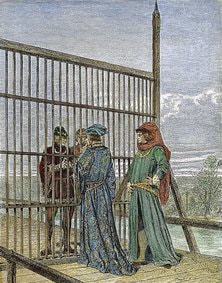
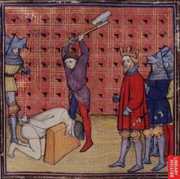
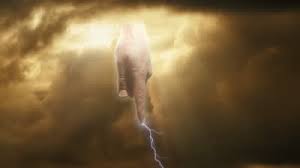
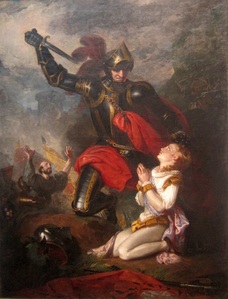
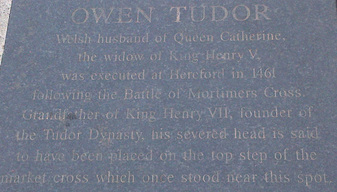
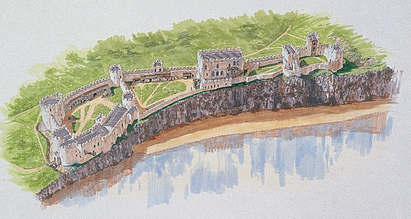
 RSS Feed
RSS Feed
